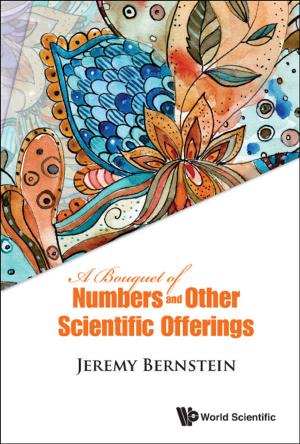Islamic Perspectives on the Principles of Biomedical Ethics
Nonfiction, Health & Well Being, Medical, Reference, Ethics, Education & Training| Author: | Mohammed Ghaly | ISBN: | 9781786340498 |
| Publisher: | World Scientific Publishing Company | Publication: | July 19, 2016 |
| Imprint: | WSPC (EUROPE)/ICP | Language: | English |
| Author: | Mohammed Ghaly |
| ISBN: | 9781786340498 |
| Publisher: | World Scientific Publishing Company |
| Publication: | July 19, 2016 |
| Imprint: | WSPC (EUROPE)/ICP |
| Language: | English |
Islamic Perspectives on the Principles of Biomedical Ethics presents results from a pioneering seminar in 2013 between Muslim religious scholars, biomedical scientists, and Western bioethicists at the research Center for Islamic Legislation & Ethics, Qatar Faculty of Islamic Studies. By examining principle-based bioethics, the contributors to this volume addressed a number of key issues related to the future of the field. Discussion is based around the role of religion in bioethical reasoning, specifically from an Islamic perspective. Also considered is a presentation of the concept of universal principles for bioethics, with a response looking at the possibility (or not) of involving religion. Finally, there is in-depth analysis of how far specific disciplines within the Islamic tradition — such as the higher objectives of Sharia (maqāṣid al-Sharī'ah) and legal maxims (qawā'id fiqhīyah) — can enrich principle-based bioethics.
Contents:
-
Methodological Issues:
- Deliberations within the Islamic Tradition on Principle-Based Bioethics: An Enduring Task (Mohammed Ghaly)
- The 'Bio' in Biomedicine: Evolution, Assumptions, and Ethical Implications (Muna Ali)
- A Maqāṣid-Based Approach for New Independent Legal Reasoning (Ijtihād) (Jasser Auda)
-
Principles of Biomedical Ethics:
- The Principles of Biomedical Ethics as Universal Principles (Tom L Beauchamp)
- Response by Ali Al-Qaradaghi to Tom Beauchamp's Paper (Ali Al-Qaradaghi)
- The Principles of Biomedical Ethics Revisited (Annelien L Bredenoord)
- Script of Oral Discussions (Day 1, Session 3)
- Script of Oral Discussions (Day 2, Session 3)
-
Islamic Perspectives on the Principles of Biomedical Ethics:
- Ethics in Medicine: A Principle-Based Approach in Light of the Higher Objectives (Maqāṣid) of Sharia (Ahmed Raissouni)
- Response by Hassan Chamsi-Pasha to Raissouni's Paper (Hassan Chamsi-Pasha)
- Script of Oral Discussions (Day 1, Session 2)
- Governing Principles of Islamic Ethics in Medicine (Abdul Sattar Abu Ghuddah)
- Response by Hassan Chamsi-Pasha to Abu Ghuddah's Paper (Hassan Chamsi-Pasha)
- Script of Oral Discussions (Day 1, Session 1)
- Formulating Ethical Principles in Light of the Higher Objectives of Sharia and Their Criteria (Ali Al-Qaradaghi)
- Script of Oral Discussions (Day 3, Session 3)
- Script of Concluding Discussions: Part One (Day 2: Session 1 and Session 2)
- Script of Concluding Discussions: Part Two (Day 3: Session 1 and Session 2)
-
Conclusion: Critical Remarks (Tariq Ramadan)
-
Glossary
-
Index
Readership: Researchers and students interested in fields of (Islamic) bioethics, Islamic studies, religion and bioethics, religious ethics, Islam and the West, and intercultural studies.
Islamic Perspectives on the Principles of Biomedical Ethics presents results from a pioneering seminar in 2013 between Muslim religious scholars, biomedical scientists, and Western bioethicists at the research Center for Islamic Legislation & Ethics, Qatar Faculty of Islamic Studies. By examining principle-based bioethics, the contributors to this volume addressed a number of key issues related to the future of the field. Discussion is based around the role of religion in bioethical reasoning, specifically from an Islamic perspective. Also considered is a presentation of the concept of universal principles for bioethics, with a response looking at the possibility (or not) of involving religion. Finally, there is in-depth analysis of how far specific disciplines within the Islamic tradition — such as the higher objectives of Sharia (maqāṣid al-Sharī'ah) and legal maxims (qawā'id fiqhīyah) — can enrich principle-based bioethics.
Contents:
-
Methodological Issues:
- Deliberations within the Islamic Tradition on Principle-Based Bioethics: An Enduring Task (Mohammed Ghaly)
- The 'Bio' in Biomedicine: Evolution, Assumptions, and Ethical Implications (Muna Ali)
- A Maqāṣid-Based Approach for New Independent Legal Reasoning (Ijtihād) (Jasser Auda)
-
Principles of Biomedical Ethics:
- The Principles of Biomedical Ethics as Universal Principles (Tom L Beauchamp)
- Response by Ali Al-Qaradaghi to Tom Beauchamp's Paper (Ali Al-Qaradaghi)
- The Principles of Biomedical Ethics Revisited (Annelien L Bredenoord)
- Script of Oral Discussions (Day 1, Session 3)
- Script of Oral Discussions (Day 2, Session 3)
-
Islamic Perspectives on the Principles of Biomedical Ethics:
- Ethics in Medicine: A Principle-Based Approach in Light of the Higher Objectives (Maqāṣid) of Sharia (Ahmed Raissouni)
- Response by Hassan Chamsi-Pasha to Raissouni's Paper (Hassan Chamsi-Pasha)
- Script of Oral Discussions (Day 1, Session 2)
- Governing Principles of Islamic Ethics in Medicine (Abdul Sattar Abu Ghuddah)
- Response by Hassan Chamsi-Pasha to Abu Ghuddah's Paper (Hassan Chamsi-Pasha)
- Script of Oral Discussions (Day 1, Session 1)
- Formulating Ethical Principles in Light of the Higher Objectives of Sharia and Their Criteria (Ali Al-Qaradaghi)
- Script of Oral Discussions (Day 3, Session 3)
- Script of Concluding Discussions: Part One (Day 2: Session 1 and Session 2)
- Script of Concluding Discussions: Part Two (Day 3: Session 1 and Session 2)
-
Conclusion: Critical Remarks (Tariq Ramadan)
-
Glossary
-
Index
Readership: Researchers and students interested in fields of (Islamic) bioethics, Islamic studies, religion and bioethics, religious ethics, Islam and the West, and intercultural studies.















